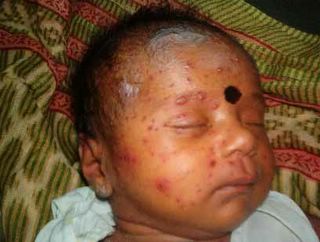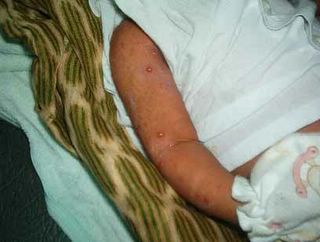The patient is a 21 day old female infant who presented with multiple generalized vesicles of two days duration. Her mother had developed varicella two days post-partum.
Physical Exam: A normally nourished child with multiple vesicles over erythematous base. Child had low grade fever. There were no oral or genital lesions and no other mucosae were invoved.


Laboratory: Nil relevant
Histopathology: Not done
Diagnosis: Neonatal varicella (NV)
Comments: NV is not seen very commonly. It usually occurs when the mother has an attack of varicella during post partum period as in this case. The child presented here was treated with IV aciclovir with good results.
Varicella occuring in the mother during pregnancy may end up in congenital varicella syndrome in the new born.
Questions: What are the members' experience with neonatal varicella.
Some pediatricians do not use aciclovir and manage with supportive measures and antibiotics. Are they justified?
I personally feel that all children with varicella should be treated with aciclovir or appropraite antivirals. This will definitely bring down the chances of herpes zoster at a later date, given the scarring, pain, and other sequelae of herpes zoster.
Comments of Brian Maurer
ReplyDeletePediatric Physician's Assistant
Enfield, Connecticut, USA
Infants born to mothers who develop varicella infection 5 days before to 2
days after delivery are at high risk for developing neonatal varicella
infection, which can be severe and sometimes fatal.
In the USA, the standing recommendation is to administer Varicella-Zoster
Immunoglobulin (VZIG) to these babies, which provides passive protection
against VZV for the subsequent 28 days (well beyond the 14 to 21-day
incubation period).
I don't know about the availability of VZIG in Chennai, or whether the
mother was seen by a physician in a timely fashion. VZIG may
be impossible to get, or at best very expensive. Still, had this infant
gotten VZIG, chances she wouldn't have had to undergo a
subsequent 7 to 10-day course of acyclovir at 21 days of age.
Congenital varicella syndrome is generally only seen in babies that have
been exposed to VZV in utero prior to 20-weeks gestation. Interestingly, if
the mother develops varicella more than five days prior to delivery, the
infant has less of a chance of developing severe varicella in the neonatal
period, due to passive protection afforded by the placental transfer of
maternal VZV antibody.
Finally, these children should generally receive varicella vaccine at one
year of age to boost their immunity to VZV.
Jayakar Thomas said...
ReplyDeleteThanks Brian for your comments.
As you rightly pointed out the administration of VZIG for this baby is the right thing but was not economically feasible.
I have a doubt. Should this child receive VZV vaccine at age one? Has not the immunity developed with the infection? Can the vaccination be deferred?